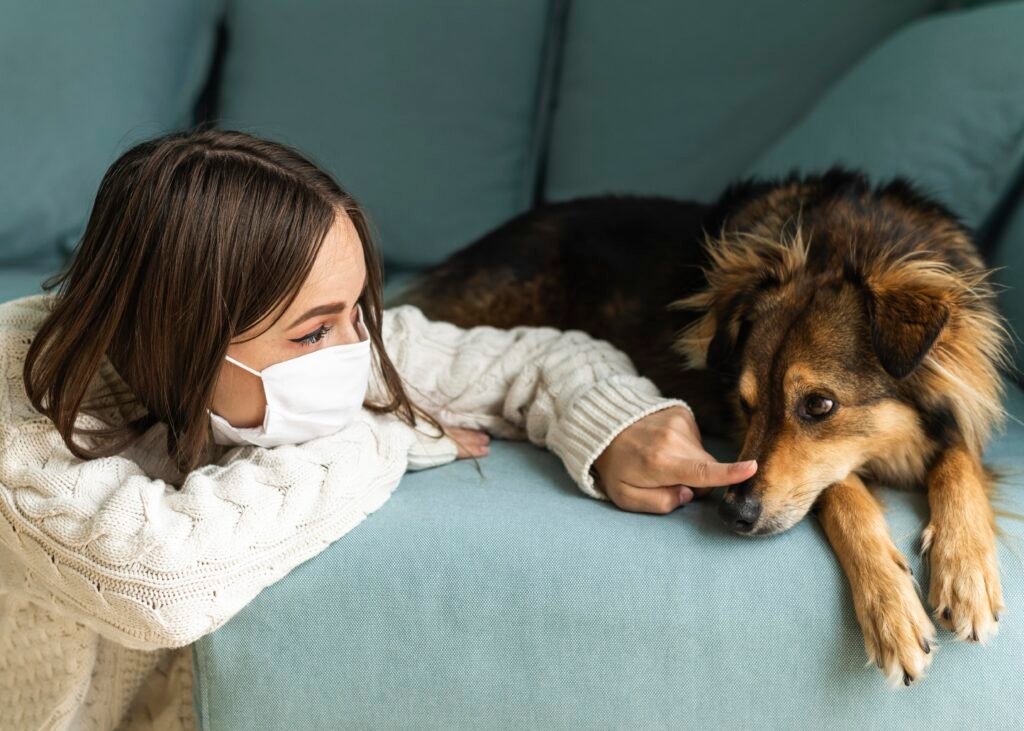Our Location
304 North Cardinal St.
Dorchester Center, MA 02124


Canine influenza virus (CIV), often known as “dog flu,” is a highly contagious respiratory virus that affects dogs of all breeds and ages. While it has been detected throughout most of the United States, fortunately, it typically doesn’t result in fatalities in dogs and may not require a visit to the veterinarian for many cases.
CIV is caused by two distinct types of influenza viruses: H3N2 and H3N8. Originally affecting other canine species, birds, and equines, these viruses have now also adapted to infect dogs. While H3N2 can affect cats, neither virus has been reported to infect humans.
Because this is a respiratory virus, your dog will experience symptoms associated with respiratory disease and common flu-like symptoms, such as:
If you notice any of these symptoms in your dog, especially if they persist or worsen, it’s important to consult your veterinarian for proper diagnosis and treatment.
CIV is highly contagious among dogs and can spread rapidly through various means. Research indicates that the virus can travel up to 20 feet in respiratory droplets when infected dogs cough or sneeze. While direct contact is the primary mode of transmission, dogs can also contract the virus indirectly through shared items like food and water bowls, toys, and leashes, and even through human contact, such as handling an infected dog and then interacting with others. After exposure, it typically takes a few days for symptoms to appear, and infected dogs can remain contagious for about four weeks. While all dogs are susceptible, those from shelter environments may be at increased risk.
CIV is categorized within the influenza A virus group, distinguished by their hemagglutinin (H) and neuraminidase (N) proteins. Typically, these viruses are species-specific, but through mutations and other adaptations, they can cross over to affect other animals.
The H3N8 and H3N2 strains, observed in dogs, are notable examples. Originally found in horses, the H3N8 virus was detected in the U.S. dog population in 2004. The H3N2 strain, traced back to the Asian bird population, was first identified in the United States in 2015. Importantly, there is currently no evidence to suggest that humans can contract dog flu or vice versa.
If your dog displays symptoms resembling respiratory infections, prompt testing is crucial for accurate treatment. Typically, a PCR panel is conducted for CIV, involving swabs from the nose, conjunctiva, or pharynx, which are then analyzed for viral DNA in a laboratory. Additional assessments like bloodwork and chest radiographs are often advised to gauge overall health, and hydration levels, and to detect pneumonia, a potentially life-threatening complication that requires immediate attention.
Before visiting your veterinarian, it’s advisable to call ahead and inform them of your dog’s flu-like symptoms. This allows them to implement necessary protocols to minimize transmission risks to other dogs.

Treatment for CIV in dogs primarily focuses on supportive care. Ensuring your dog remains calm, rested, and well-hydrated is essential for a speedy recovery. Hospitalization may involve IV fluids, cough suppressants, and nutritional support. In cases where secondary bacterial infections occur, antibiotics such as Clavamox or doxycycline are commonly prescribed.
Infected dogs should be isolated from other dogs (and cats) as soon as symptoms appear and for the subsequent 4 weeks. This entails avoiding activities like visits to dog parks, boarding, and grooming. Additionally, pet parents should refrain from interacting with other dogs (and cats) during this period to prevent transmission via clothing.
Thankfully, most dogs recover from CIV without major complications within a few weeks, often experiencing only a lingering cough. However, younger or older dogs, as well as those with weakened immune systems, may face more severe symptoms like pneumonia, which can be life-threatening. Seeking prompt veterinary care at the first sign of illness is crucial for ensuring the best possible outcome for your dog.
Thankfully, there are vaccines available for dogs to safeguard against both strains of CIV. Manufactured by Nobivac and Zoetis, this vaccine can be administered to puppies as young as 7 or 8 weeks old, followed by a booster shot 3 weeks later and then annually thereafter. While rare, potential side effects may include symptoms associated with hypersensitivity and allergic reactions, such as vomiting, diarrhea, facial swelling, hives, and—although less likely—shock and death. Not all dogs are equally susceptible to the disease, but those that frequent boarding or grooming facilities, doggie daycares, dog parks, dog shows, or other competitions are at higher risk.
Discuss with your veterinarian the risk factors specific to your dog, as well as the advantages and disadvantages of vaccination. While vaccines may not guarantee the prevention of infection, they can significantly reduce the likelihood of contracting the virus, and if an infection does occur, symptoms are typically less severe and the duration of illness is shorter.
Thankfully, the influenza virus is susceptible to common household cleaners such as bleach and soapy water, making it easy to eliminate from the environment. Remember to wash your hands and clothing before and after interacting with any dogs, and especially between different dogs.